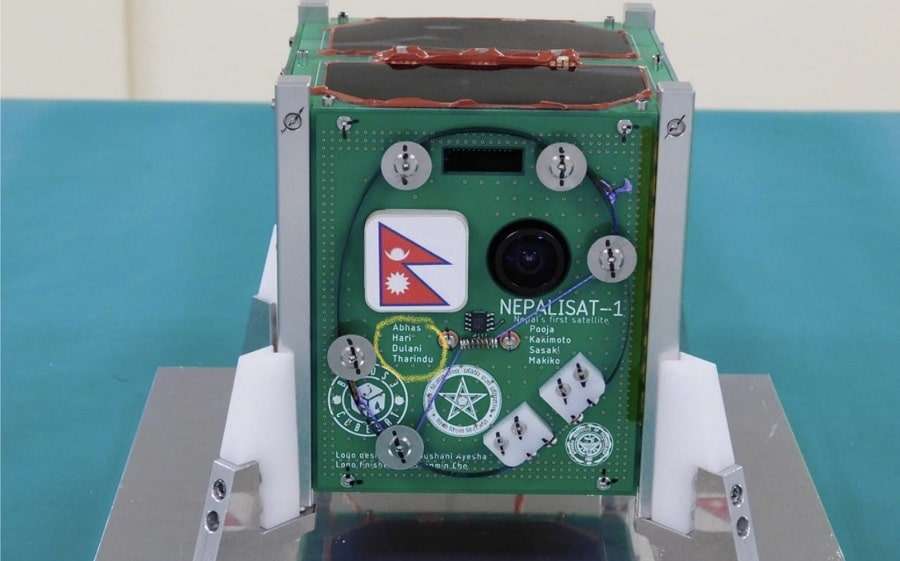Nepal realizes its dream of having its own satellite by launching the first satellite into space. The first satellite named NepaliSat-1 was launched in the…
View More Nepal launches its first Satellite named Nepali Sat-1Category: Satellites
Successful launch propels OneWeb to $1.25B in new funding
Following the successful launch and deployment of the first six satellites in a planned constellation of hundreds, OneWeb has raised $1.25 billion in funding to kickstart mass production. It’s a powerful endorsement of and ambitious plan to create an entirely new layer of global connectivity. To blanket the world in internet, OneWeb means to send […]
View More Successful launch propels OneWeb to $1.25B in new fundingWatch OneWeb’s first six global internet satellites launch today
After four years and more than $2 billion in funding, OneWeb is ready to launch the first six satellites out of a planned constellation of 650 with which it plans to blanket the world in broadband. The Arianespace-operated Soyuz rocket will take off at 1:37 Pacific time from Guiana Space Center.
View More Watch OneWeb’s first six global internet satellites launch todayWatch a space harpoon impale a piece of space debris

The U.S. government tracks 500,000 chunks and bits of space junk as they hurtle around Earth. Some 20,000 of these objects are larger than a softball.
To clean up the growing mess, scientists at the University of Surrey have previously tested a net to catch chunks of debris. Now, they’ve successfully tested out a harpoon.
The video below, released Friday by the university’s space center, shows a test of the experimental RemoveDEBRIS satellite as it unleashes a harpoon at a piece of solar panel, held out on a 1.5-meter boom.
The harpoon clearly impales its target.
“This is RemoveDEBRIS’ most demanding experiment and the fact that it was a success is testament to all involved,” Guglielmo Aglietti, director of the Surrey Space Centre at the University of Surrey, said in a statement. Read more…
More about Space, Science, Space Junk, Satellites, and Science
View More Watch a space harpoon impale a piece of space debrisSwarm Technologies raises $25M to deploy its own 150-satellite constellation
Swarm Technologies is one of several companies looking to populate low Earth orbit with communications satellites, setting itself apart with the sheer smallness of its devices — and of course with the notoriety of having defied the FCC and earned a fine. But investors are bullish, and the company has just raised a $25 million round A to put 150 of its tiny SpaceBEEs in orbit.
View More Swarm Technologies raises $25M to deploy its own 150-satellite constellationTo rebuild satellite communications, Ubiquitilink starts at ground level
Communications satellites are multiplying year by year as more companies vie to create an orbital network that brings high-speed internet to the globe. Ubiquitilink, a new company headed by Nanoracks co-founder Charles Miller, is taking a different tack: reinventing the Earthbound side of the technology stack.
View More To rebuild satellite communications, Ubiquitilink starts at ground levelFCC fines Swarm Technologies $900K over unauthorized satellite launch
Back in March came the surprising news that a satellite communications company still more or less in stealth mode had launched several tiny craft into orbit — against the explicit instructions of the FCC. The company, Swarm Technologies, now faces a $900,000 penalty from the agency as well as extra oversight of its continuing operations.
View More FCC fines Swarm Technologies $900K over unauthorized satellite launchAWS launches a base station for satellites as a service
Today at AWS Re:invent in Las Vegas, AWS announced a new service for satellite providers with the launch of AWS Ground Station, the first fully-managed ground station as a service. With this new service, AWS will provide ground antennas through their existing network of worldwide availability zones, as well as data processing services to simplify […]
View More AWS launches a base station for satellites as a serviceFCC approval of Europe’s Galileo satellite signals may give your phone’s GPS a boost
The FCC’s space-focused meeting today had actions taken on SpaceX satellites and orbital debris reduction, but the decision most likely to affect users has to do with Galileo. No, not the astronomer — the global positioning satellite constellation put in place by the E.U. over the last few years. It’s now legal for U.S. phones to use, and a simple software update could soon give your GPS signal a major bump.
View More FCC approval of Europe’s Galileo satellite signals may give your phone’s GPS a boostRocket Lab’s big ‘It’s Business Time’ launch targets this weekend for takeoff
Upstart launch provider Rocket Lab aims to finally launch its first fully commercial payload to orbit this weekend after months of delays. The small Electron rocket will take six satellites from four companies to orbit as early as tomorrow evening Pacific time — Sunday afternoon at the company’s launch site in New Zealand.
View More Rocket Lab’s big ‘It’s Business Time’ launch targets this weekend for takeoffSpaceX’s Starlink aims to put over a thousand of its communications satellites in super-low orbit
SpaceX’s planned communication satellite constellation, known as Starlink, will now be targeting a much lower orbit than originally planned, at least for over a thousand of the satellites, the company revealed in an FCC filing. The move should help mitigate orbital debris and provide better signal for the company’s terrestrial users as well.
View More SpaceX’s Starlink aims to put over a thousand of its communications satellites in super-low orbitSpaceX shuffles Starlink leadership, hoping to accelerate launch
SpaceX is changing the lineup at the Seattle-based offices of Starlink, the company’s nascent satellite broadband division. A Reuters report depicts a whirlwind visit by CEO Elon Musk as a middle management bloodbath, but SpaceX says it’s just the usual fast-moving space company stuff.
View More SpaceX shuffles Starlink leadership, hoping to accelerate launch

